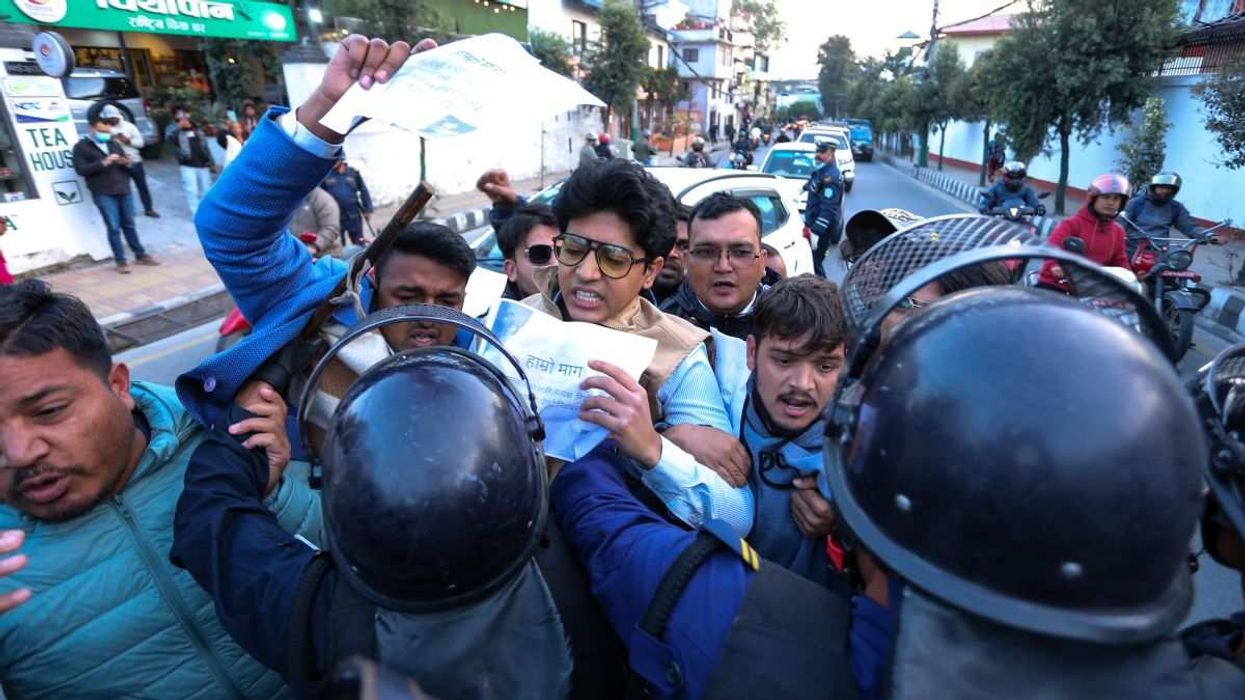As the Russian invasion of Ukraine enters its third week, the humanitarian toll is mounting, with thousands of civilian casualties. More than 3 million Ukrainians have already fled the country and another 2 million have become internally displaced. According to the United Nations, the crisis could end up displacing more than 10 million people, many of them children.
There’s been an outpouring of international support for the Ukrainian people. Not only are many of the world’s governments sending Ukraine billions of dollars’ worth of military and economic aid, but businesses and regular people are also being inspired to show support for the victims of the war.
For anyone who is tired of feeling helpless in the face of this tragedy, here are some novel and not-so-novel ways to help.
Want to understand the world a little better? Subscribe to GZERO Daily by Ian Bremmer for free and get new posts delivered to your inbox every week.
1. Hosting a refugee
People who feel comfortable opening their home to civilians fleeing the war have a couple of options to offer temporary shelter.Airbnb.org will take care of vetting individual refugees, connecting them with hosts, and providing liability insurance and damage protection. People who don’t have space but still want to help give refugees short-term housing can donate to Airbnb.org to fund other hosts and get their donation matched (and deducted from their taxes to boot!).
For those who'd prefer to use a non-corporate tool there's also UkraineTakeShelter.com, an independent platform created by two Harvard undergrads to connect fleeing Ukrainians with potential hosts. All potential hosts need to do is provide their contact information and nearest city.
2. Telling Russians what’s really going on
Thanks to President Vladimir Putin’s censorship and propaganda efforts, the vast majority of Russians have been made to believe the invasion of Ukraine is just a “special military operation” designed to liberate their oppressed Ukrainian and ethnic Russian brethren from a gang of neo-Nazis and drug addicts. There’s no war, no targeting of Ukrainian civilians, no tanks rolling into Kyiv. Anyone inside Russia who tells them differently risks going to jail for 15 years, and they’ve been blocked from accessing much of the world’s internet and independent media.
But in today's interconnected world, Russia's information Iron Curtain isn't unbreachable. For starters, anyone can use the Outline tool created by Jigsaw to set up their own VPN server and give large numbers of Russians free and safe access to the global internet.
1920.in, a website developed by Polish programmers, lets anyone send texts, WhatsApp messages, and emails directly to random Russians with the truth about the war. All one has to do is enter the number or email address at the top of the screen into your phone, copy/paste the message text in Russian, and hit send. Get a new recipient, rinse, and repeat.
If that seems cumbersome, mail2ru.org allows people to email up to 150 Russians at a time, drawn from a list of more than 90 million email addresses including those of every Russian member of parliament. The more Russians learn the truth about the war in Ukraine, the more likely it is they will rise up and demand that Putin end it.
Remember: Most Russians bear no responsibility for Putin’s war of aggression, so civility is key.
3. Countering Russian disinformation in the West
The Russian war machine has been hard at work spreading fake, misleading, and manipulated information about the conflict on social media platforms, in an effort to sow confusion, equivocate, and deflect blame. Many of these attempts are highly sophisticated and therefore effective.
But that doesn’t mean you have to fall for them—or let others. Those interested in fighting disinformation can purge their social accounts of Russian bots with Bot Sentinel. Instead of taking inflammatory images, videos, and claims at face value, they should fact-check them first. The Bellingcat website is keeping track of Russian-fabricated claims and footage misinformation, and these handy guides offer practical tips for regular people to vet any information they come across online themselves.When in doubt, it's prudent to refrain from sharing anything that hasn't been confirmed by multiple reputable sources. And upon spotting fake news, the responsible thing is to report it and call out BS publicly.
4. Donating money
Boring, I know. But during a crisis like this, when so many millions are in desperate need of food, shelter, medicine, and so much more, every dollar counts. Here’s a list of only a few of the dozens of trusted organizations that have been working tirelessly to help Ukrainians since February 24:
- Armed Forces of Ukraine
- Come Back Alive
- Razom
- Sunflower of Peace
- Hospitallers
- Voices of Children
- United Nations Children's Fund
- Insight
- Humanity & Inclusion
- The Coalition to Support Black People in Ukraine
- 24.02fund
- The Kyiv Independent
- Zaborona Media
- CARE
- Direct Relief
- GlobalGiving
- International Committee of the Red Cross
- Project C.U.R.E.
- International Rescue Committee
- United Nations High Commissioner for Refugees
Many of these organizations accept crypto in addition to bank transfers, PayPal, and credit/debit cards. More resources can be found at SupportUkraineNow.org and StandForUkraine.com.
5. Staying informed
Being on top of what’s happening on the ground and why is the first step toward helping Ukrainians. Trustworthy news sources like the Kyiv Independent and Euromaidan Press are covering events in English from the front lines, while newsletters this one and GZERO Media's Signal offer up-to-date, fair, and honest analysis of the conflict.
Thanks for reading. We can all make a difference.
🔔 And if you haven't already, don't forget to subscribe to my free newsletter, GZERO Daily by Ian Bremmer, to get new posts delivered to your inbox.



















